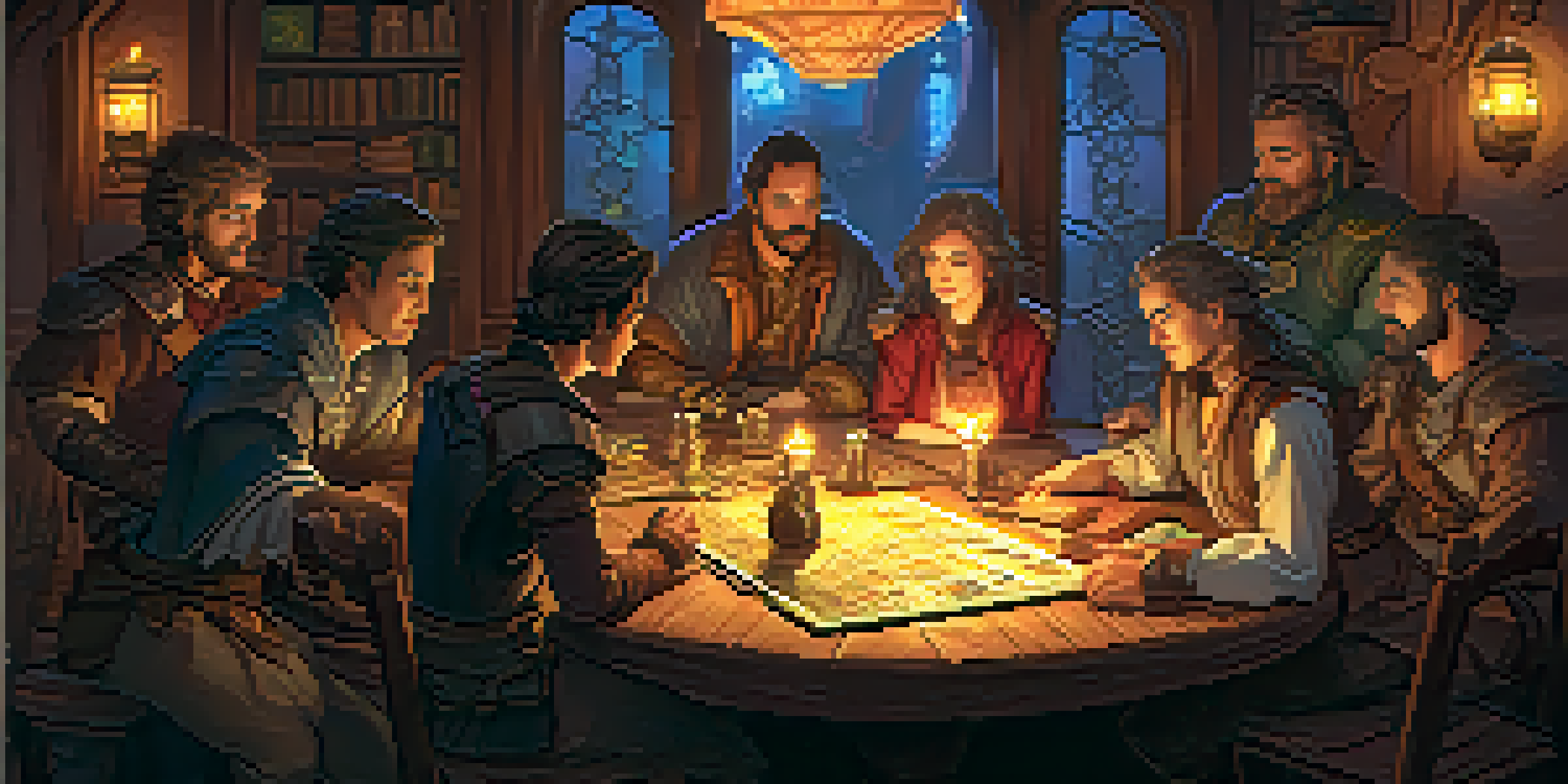Role-Playing Games: A Tool for Social Skills and Empathy

Understanding Role-Playing Games and Their Appeal
Role-playing games (RPGs) have captivated players for decades, offering immersive experiences where individuals can step into the shoes of various characters. Whether it's slaying dragons or solving mysteries, RPGs provide a unique platform for storytelling and creativity. But beyond the fantasy elements, these games serve a deeper purpose in helping players develop vital social skills.
Games are a way to escape but also a way to connect with others in a meaningful way.
At their core, RPGs require collaboration and communication among players, creating a dynamic environment where teamwork is paramount. As players navigate complex scenarios and make decisions together, they learn the importance of listening and negotiating with others. This shared experience fosters a sense of community, making the games not just a pastime but a valuable social exercise.
Moreover, the diverse range of characters and narratives allows players to explore different perspectives, paving the way for greater empathy. By embodying characters with unique backgrounds and motivations, players can better understand the feelings and experiences of others, which is crucial in building social connections.
Enhancing Communication Skills Through RPGs
One of the most significant benefits of RPGs is their ability to enhance communication skills. In a typical session, players must articulate their thoughts, plans, and character actions clearly for everyone to understand. This constant practice encourages players to express themselves more effectively, which can translate to real-life situations, such as school, work, and social gatherings.

Additionally, RPGs often require players to engage in dialogue that reflects their character's personality and motivations. This role-play encourages individuals to think critically about how they communicate, considering tone, body language, and choice of words. Such skills are essential not only in gaming but also in everyday interactions.
RPGs Enhance Social Skills
Role-playing games foster collaboration, communication, and empathy, helping players develop vital social skills.
Through these experiences, players learn to adapt their communication styles to different contexts. This flexibility enhances their social competence, allowing them to connect with a diverse range of people in various situations.
Building Teamwork and Cooperation in RPGs
Teamwork is at the heart of most role-playing games, where players must work together to overcome challenges. Each character typically has unique strengths and weaknesses, and understanding how to utilize these attributes effectively requires cooperation. This collaborative effort fosters a sense of unity and shared purpose among players.
Role-playing games encourage not only creativity but also the understanding of others’ perspectives and emotions.
As players strategize and execute plans, they learn the value of compromise and recognizing the contributions of others. This process not only strengthens their ability to collaborate but also builds trust within the group, which is essential for healthy relationships both in and out of the game.
Moreover, successful teamwork in RPGs often leads to memorable experiences and achievements, reinforcing the idea that working together can yield rewards. This lesson can encourage players to seek collaborative opportunities in their everyday lives, enhancing their social skills further.
Fostering Empathy Through Character Perspectives
One of the most profound ways RPGs nurture empathy is through character development. Players often create complex characters with distinct backgrounds, motivations, and emotions. By immersing themselves in these characters, players can experience life from perspectives vastly different from their own, promoting understanding and compassion.
For instance, a player may role-play a character who has faced significant adversity, allowing them to grasp the emotional weight of such experiences. This engagement can lead to a deeper appreciation of real-world issues, such as poverty, discrimination, or mental health struggles.
Teamwork is Essential in RPGs
Players learn the value of teamwork and cooperation, which translates to improved relationships outside the game.
By stepping into someone else's shoes—albeit virtually—players can cultivate a sense of empathy that extends beyond the game. This newfound understanding can inspire players to be more thoughtful and considerate in their interactions with others in their daily lives.
Conflict Resolution Skills Developed in RPGs
Conflict is a common occurrence in RPGs, whether between characters or rival factions. Navigating these conflicts often requires players to engage in negotiations, compromise, and problem-solving. As they face these challenges, players develop essential conflict resolution skills that can be applied in real-life scenarios.
For example, when disagreements arise over a game strategy, players must communicate their viewpoints effectively and listen to others' perspectives. This practice teaches them how to approach conflicts with an open mind, seeking solutions that benefit everyone involved rather than resorting to aggression or withdrawal.
By honing these skills in a safe and structured environment, players become better equipped to handle disputes in their daily lives. This ability to resolve conflicts amicably is a crucial social skill that enhances interpersonal relationships.
Creating a Safe Space for Self-Expression
RPGs provide a unique platform for self-expression, allowing players to explore different aspects of their identities. In a game, individuals can experiment with various personalities, choices, and moral dilemmas without the constraints of real-life repercussions. This freedom can be liberating and is essential for personal growth.
As players navigate their characters' journeys, they often confront their fears, aspirations, and values. This exploration can lead to profound self-reflection and a better understanding of one's beliefs and emotions. Such insights are invaluable for developing emotional intelligence, a key component of effective social interactions.
RPGs Provide Mental Health Benefits
Engaging in RPGs offers a form of escapism and helps build social connections, positively impacting mental health.
Furthermore, the inclusive and supportive nature of many gaming communities fosters an environment where players feel safe to express their true selves. This sense of belonging can significantly enhance their confidence, enabling them to engage more openly with others in their everyday lives.
The Positive Impact of RPGs on Mental Health
Engaging in role-playing games can have a positive impact on mental health. The immersive nature of RPGs allows players to escape from the stresses of everyday life, providing a much-needed break for mental rejuvenation. This form of escapism can be particularly beneficial for individuals facing anxiety, depression, or social isolation.
Moreover, the collaborative aspects of RPGs help players build social connections, which are essential for emotional well-being. The friendships formed during gaming sessions can lead to a strong support network, providing players with a sense of community and belonging.

Additionally, the skills developed through RPGs—such as empathy, communication, and conflict resolution—can contribute to improved mental health. These skills empower individuals to navigate relationships more effectively, reducing feelings of loneliness and enhancing overall life satisfaction.